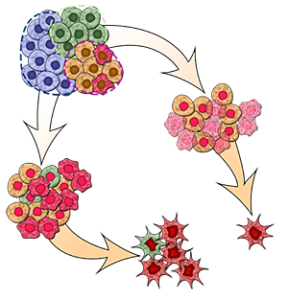CSBC U54 Grant
 Our Cancer Systems Biology Center of HoPE (Heterogeneity of Phenotypic Evolution) will develop a suite of systems-based methodologies to understand how genomic diversity, clonal evolution, and phenotypic change interact in the progression toward chemoresistant breast and ovarian cancer. To evaluate their potential for translation, we will integrate these dynamic models with clinical trials that will evaluate whether these phenotypic changes can be targeted for therapy. We hypothesize that acquired resistance emerges from selection acting on phenotypes during tumor evolution, and that simultaneously measuring and modeling subclone genotypes and phenotypes will identify new, and testable, therapeutic targets.
Our Cancer Systems Biology Center of HoPE (Heterogeneity of Phenotypic Evolution) will develop a suite of systems-based methodologies to understand how genomic diversity, clonal evolution, and phenotypic change interact in the progression toward chemoresistant breast and ovarian cancer. To evaluate their potential for translation, we will integrate these dynamic models with clinical trials that will evaluate whether these phenotypic changes can be targeted for therapy. We hypothesize that acquired resistance emerges from selection acting on phenotypes during tumor evolution, and that simultaneously measuring and modeling subclone genotypes and phenotypes will identify new, and testable, therapeutic targets.
Selective pressures from therapy and the tumor microenvironment can propel subclones from every patient’s tumor along an evolutionary trajectory that leads to resistance. Indeed, our data shows that both genetic and phenotypic diversity among tumor subclones evolves as cancer cells progress to a resistant state. However, it is not yet known the specific phenotypes that promote that resistant state, the interactions among them, and how they converge to common resistant phenotypes seen in late stage cancer. To address these and other questions, we will develop a new class of dynamical systems models of subclone evolution to characterize the changes and development of key cell states that arise during acquired chemo-resistance and metastasis using our unique patient cohorts. These mechanistic models will identify points of therapeutic vulnerability that we will test in clinical trials aimed at blocking evolution to a resistant state by targeting critical resistant phenotypes.
Our Center is comprised of an Administrative, Education/Outreach, Translational, and Computational Cores, in addition to two complementary projects. The synergies are derived from: 1) the convergent parameterization of the evolutionary models drawn from deep longitudinal patient progression studies (Project 1) and broad multisite metastatic tumor analyses (Project 2), resulting in a robust model to identify resistant states for clinical targeting; and 2) an integrated computational and experimental framework and resources for dissecting tumor heterogeneity and evolution that will contribute to an improved capacity for personalized cancer therapy. Our multidisciplinary team of systems biologists, bioinformaticians, tumor biologists, pharmacologists, mathematical biologists, and clinicians will tackle these scientific challenges. We will create programs to educate the next generation of scientists in systems biology and inform the community about the latest scientific advances and their impact on treatment strategies. And we will provide state of the art tools for the analysis of patient samples and tumor genomic complexity. These studies move beyond prior research by integrating cell population dynamics and cellular phenotypes with cellular genotypes, and will deliver approaches and a knowledge base to block or reverse the transition to a resistant state for advanced stage cancer patients.